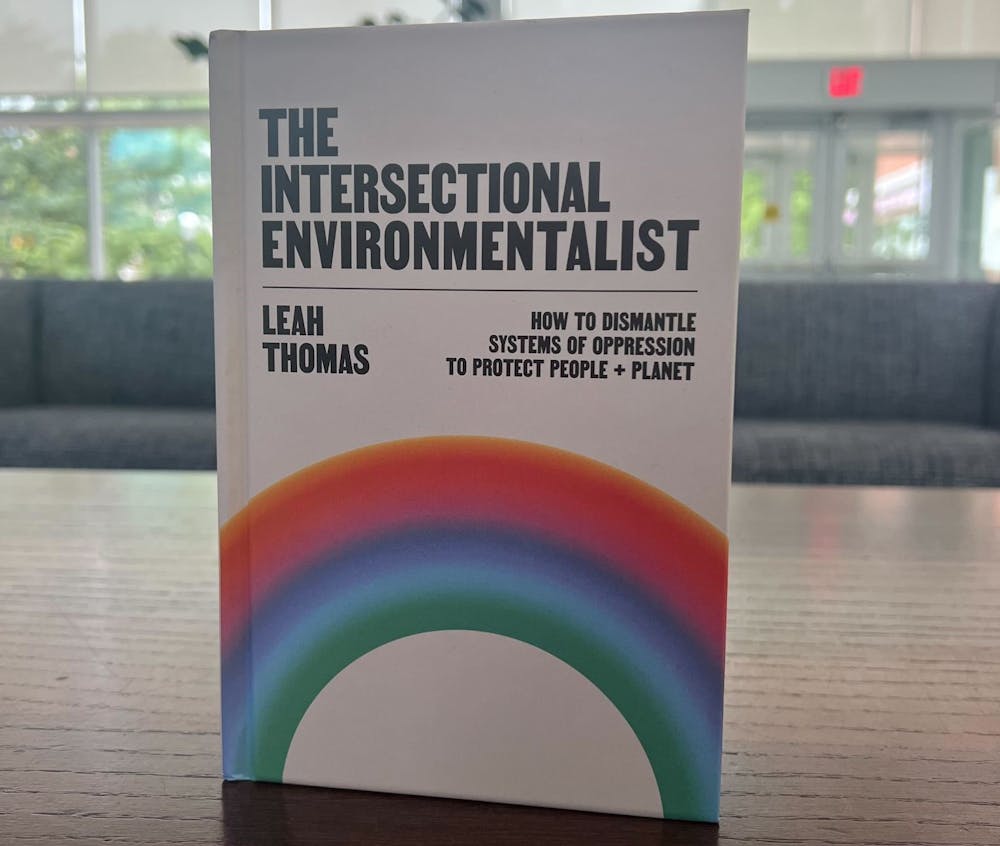Before coming to campus, incoming freshmen were instructed to read “The Intersectional Environmentalist: How to Dismantle Systems of Oppression to Protect People + the Planet,” which focuses on the intersections between systems of oppression and the climate crisis. This is the first time in a decade that the common reading book highlighted environmental issues, according to Paula Patch, chair of the common reading selection committee.
“We haven’t had a book that was specifically about sustainability and environmentalism in about a decade, and we wanted to have that as another theme or a major theme,” Patch said.
In a brief synopsis of the book, the author, Leah Thomas, refers to the book saying it is “an introduction to the intersection of environmentalism, racism and privilege, and an acknowledgment of the fundamental truth that we cannot save the planet without uplifting the voices of its people.”
Patch said the selection takes around 18 months, allowing for a thorough process.
“We start by sending an email out to all faculty and staff, as well as the surrounding community,” Patch said.
The list of suggested books starts with 20 to 30 books, mostly given by faculty either teaching a COR1100: The Global Experience class or submitting a book that had previously worked well in their classes.
“Most of the books are sent in from faculty. We usually only get about 10 or 15 recommendations from the wider community, which is kind of interesting, because I would love it if we had 500 to choose from, especially because we would start to see some consensus and some interest,” Patch said.
The chosen book is designed to focus on an issue the committee believes is important for students to discuss in their classes. Patch said criticisms of the common reading tend to come after students start reading.
“What we sometimes get is criticism at the end, like, ‘Well, why did you choose this?’ And I think, ‘You could have recommended a book to us.’” Patch said. “We also get recommendations for things like classics, going back to Greek philosophy, which is not going to work as a book for current students.”
Students are also selected to be a part of the common reading selection committee. Junior Selma Maric was on the panel for this year’s reading and reflected on her experience.
“Being on the common reading committee has truly been an incredible part of my Elon experience,” Maric said.“The staff and faculty on the committee are so kind and they value every opinion that is shared with them.”
Maric also said the common reading is important for freshmen to engage with.
“I would love to see more interaction between students and the common reading,” Maric said.
“As a student representative, I try my best to keep every perspective in mind when choosing a new book — but choosing a book for 1,700 plus people to get through and also enjoy is difficult, all the feedback is helpful and so valuable,” Maric said.
Being on the common reading committee also has helped Maric learn more about the process, and has changed her perspective on the program as a whole, she said.
“It is just an awesome experience,” Maric said. “The staff and faculty on the committee are so kind and they value every opinion that is shared with them. I feel excited to promote the book and hope that everyone can see the importance of the messages within each book that we choose.”
The book is available for all freshmen to read through Moodle, which also allows students to share their thoughts on what they want their professor to do with the book in their COR classes through a forum on the Moodle page.
Patch said she believes students having access to give feedback helps both those students, and the faculty in the class.
“It gives us invaluable knowledge into the student’s perspective on the books they choose,.” Patch said.
The entire Elon community will have a chance to interact with the book and the author during the speaker series this fall. Leah Thomas, the author of the common reading, will be speaking at 7 p.m. Sept. 19 in the Alumni Gym.


